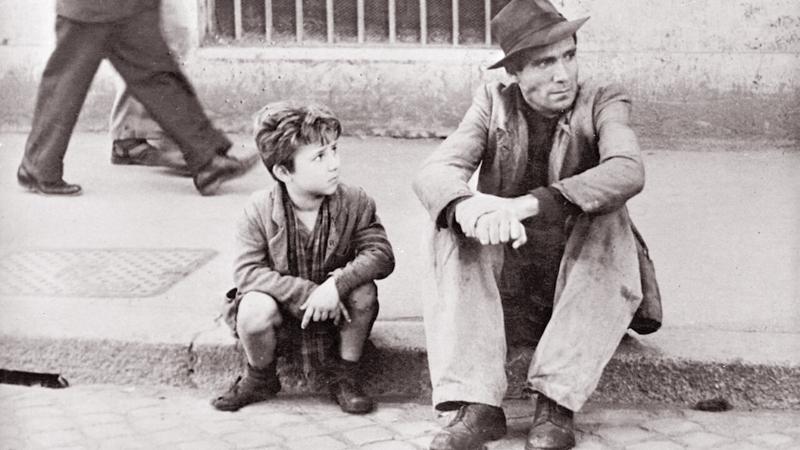
Bicycle Thieves is a 1948 Italian neorealist drama film directed by Vittorio De Sica. It follows the story of a poor father searching post-World War II Rome for his stolen bicycle, without which he will lose the job which was to be the salvation of his young family.
Adapted for the screen by Cesare Zavattini from the 1946 novel by Luigi Bartolini, and starring Lamberto Maggiorani as the desperate father and Enzo Staiola as his plucky young son, Bicycle Thieves received an Academy Honorary Award (most outstanding foreign language film) in 1950 and, in 1952 was deemed the greatest film of all time by Sight & Sound magazine’s poll of filmmakers and critics; fifty years later another poll organized by the same magazine ranked it sixth among the greatest-ever films.
In the 2012 version of the list the film ranked 33rd among critics and 10th among directors. The film was also cited by Turner Classic Movies as one of the most influential films in cinema history, and it is considered part of the canon of classic cinema.
Critical reception
When Bicycle Thieves was released in Italy, it was viewed with hostility and as portraying Italians in a negative way. Italian critic Guido Aristarco praised it, but also complained that “sentimentality might at times take the place of artistic emotion.” Fellow Italian neorealist film director Luchino Visconti criticized the film, saying that it was a mistake to use a professional actor to dub over Lamberto Maggiorani’s dialogue. Luigi Bartolini, the author of the novel from which de Sica drew his title, was highly critical of the film, feeling that the spirit of his book had been thoroughly betrayed because his protagonist was a middle-class intellectual and his theme was the breakdown of civil order.
 Bicycle Thieves has continued to gain very high praise from critics, with the film-review aggregator ‘Rotten Tomatoes’ reporting 98% positive reviews from 54 reviews, with an average 9.1 out of 10 rating. The picture is also in the Vatican’s Best Films List for portraying humanistic values.
Bicycle Thieves has continued to gain very high praise from critics, with the film-review aggregator ‘Rotten Tomatoes’ reporting 98% positive reviews from 54 reviews, with an average 9.1 out of 10 rating. The picture is also in the Vatican’s Best Films List for portraying humanistic values.
Bosley Crowther, film critic for The New York Times, lauded the film and its message in his review.
He wrote, “Again the Italians have sent us a brilliant and devastating film in Vittorio De Sica’s rueful drama of modern city life, The Bicycle Thief. Widely and fervently heralded by those who had seen it abroad (where it already has won several prizes at various film festivals), this heart-tearing picture of frustration, which came to (the World Theatre) recently, bids fair to fulfill all the forecasts of its absolute triumph over here.
“For once more the talented De Sica, who gave us the shattering ‘Shoeshine’, that desperately tragic demonstration of juvenile corruption in post-war Rome, has laid hold upon and sharply imaged in simple and realistic terms a major — indeed, a fundamental and universal — dramatic theme.
“It is the isolation and loneliness of the little man in this complex social world that is ironically blessed with institutions to comfort and protect mankind.”
Pierre Leprohon wrote in Cinéma D’Aujourd - “What must not be ignored on the social level is that the character is shown not at the beginning of a crisis but at its outcome. One need only to look at his face, his uncertain gait, his hesitant or fearful attitudes to understand that Ricci is already a victim, a diminished man who has lost his confidence.”
Lotte Eisner called it the best Italian film since World War II and Robert Winnington called it “the most successful record of any foreign film in British cinema.”
When the film was re-released in the late 1990s, Bob Graham, staff film critic for the ‘San Francisco Chronicle’, gave the drama a positive review: “The roles are played by non-actors, Lamberto Maggiorani as the father and Enzo Staiola as the solemn boy, who sometimes appears to be a miniature man.
They bring a grave dignity to De Sica’s unblinking view of post-war Italy. The wheel of life turns and grinds people down; the man who was riding high in the morning is brought low by nightfall. It is impossible to imagine this story in any other form than De Sica’s. The new black-and-white print has an extraordinary range of grey tones that get darker as life closes in”.
Legacy
Many directors who have cited it as a major influence include Satyajit Ray, Ken Loach, Giorgio Mangiamele, Bimal Roy, Anurag Kashyap, Balu Mahendra, and Basu Chatterjee. The film was noteworthy for film directors of the Iranian New Wave, such as Jafar Panahi and Dariush Mehrjui. Also the film was one of 39 foreign films recommended by Martin Scorsese.
Filipino action star Nelson Anderson said it was the favourite Italian neorealist film of his contemporary Weng Weng, who cried upon his first viewing in the early 1980s. In a project that never materialized, they intended to depart from their usual fare by remaking it as an action-comedy with a human touch. The film was used as source material for Pee-Wee’s Big Adventure (1985). It was parodied in the film ‘The Icicle Thief’ (1989). Norman Loftis’s film Messenger (1994) is considered to be a remake of Bicycle Thieves.
Stage adaptation
A theatrical adaptation of the film was created by Littlebrain Theatre, in a devised adaptation with a cast of nine. The production premiered as part of the Rhinoceros Theatre Festival in Chicago, from January 18 to February 22, 2019.
